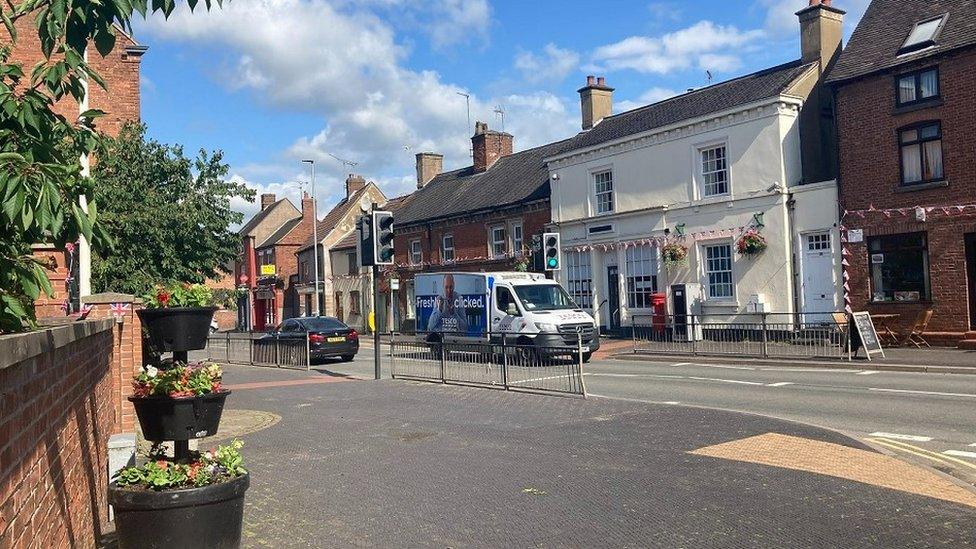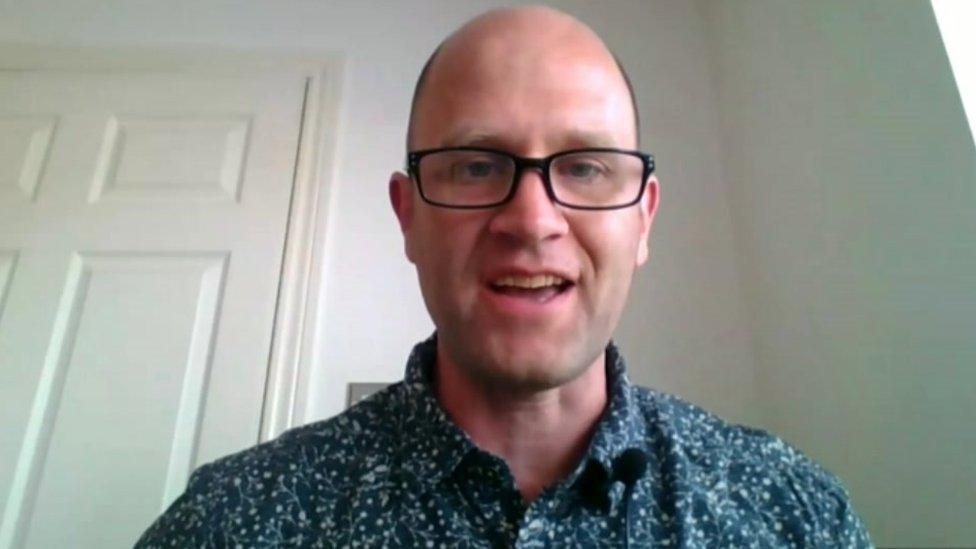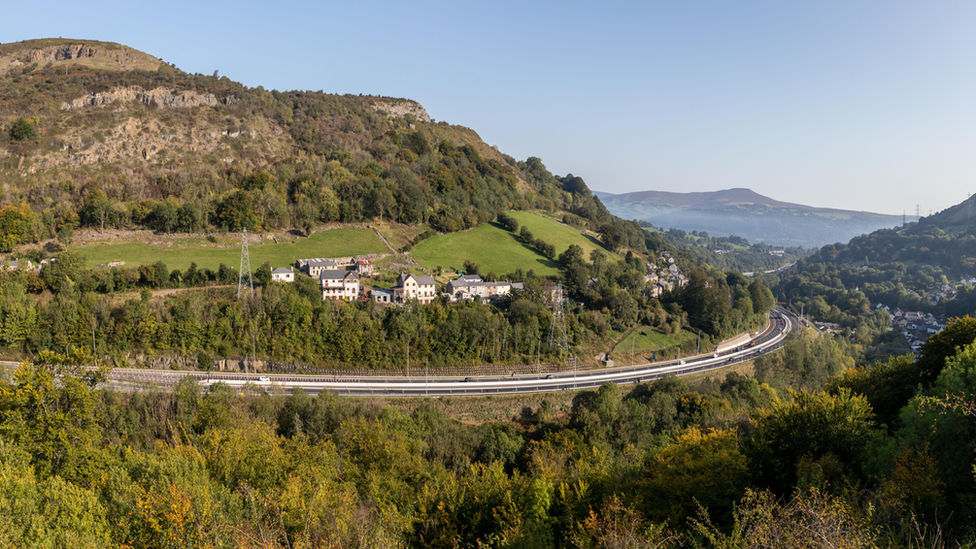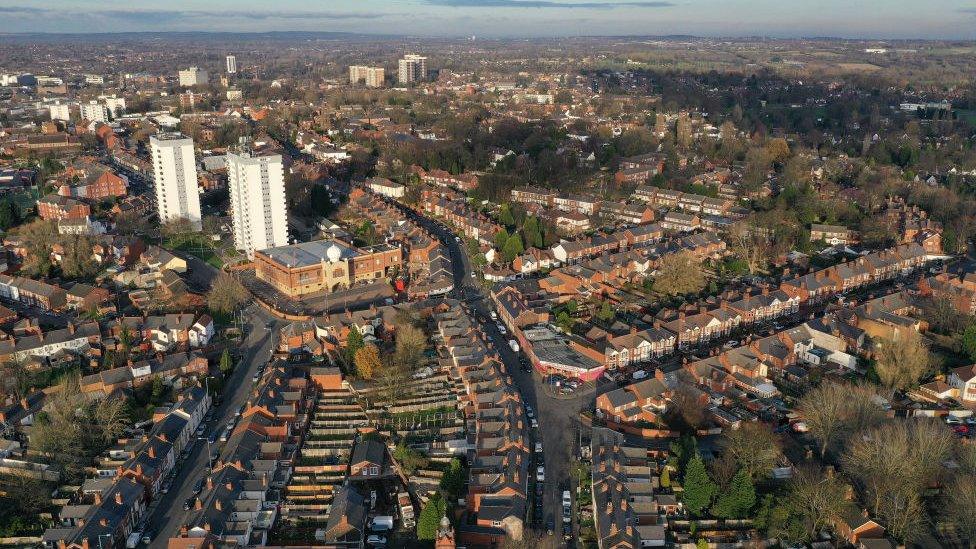Staffordshire earthquake causes rumbling and homes to shake
- Published

The quake's epicentre was in Tean, Staffordshire, confirmed the British Geological Survey
Residents reported "rumbling" and rattling windows and doors after a 3.3 magnitude earthquake hit Staffordshire on Wednesday evening.
The British Geological Survey (BGS) said the tremor's focus was 7.3km (4.5 miles) below Tean.
People as far away as Yorkshire took to social media to describe the effects.
The BGS said people had reported "an initial rumbling, then a bang" with what "felt more like a shunt, like something had hit something".
It is the largest of 21 earthquakes to strike the UK in the past two months, external.
Allow X content?
This article contains content provided by X. We ask for your permission before anything is loaded, as they may be using cookies and other technologies. You may want to read X’s cookie policy, external and privacy policy, external before accepting. To view this content choose ‘accept and continue’.
Kelvin Evans, in Upper Tean, said he heard a "very loud, weird, spooky noise, that seemed to vibrate the front of the house."
Another Tean resident, Jenni Brown, said she thought a vehicle had veered off the road and bumped the side of her house.
'A very large shake'
Carol Heather, from Hilderstone, said she felt an impact and noise so loud she thought it was a bomb.
"My hair stood on end, I was jolted out of my seat. I was just watching a film and it was really frightening, terrifying. It was such a bang."
Mark Begg, 30, said he was at home in Uttoxeter when he felt "a very large shake".
After checking the house and finding no signs of damage he concluded "it was most likely a mini-earthquake".
Tom, 38, in Cheadle said: "I was sitting watching an episode of Only Connect with my wife on YouTube and as we opened another bottle of wine the whole house shook.
"I thought either one of the children had fallen out of bed or something else had happened."
Several people in Derbyshire also reported feeling the quake which included Gurj Sanghera who tweeted, external to ask if anyone else felt it in Derby while Andy Savage posted, external "there was deffo something it was brief".
Allow X content?
This article contains content provided by X. We ask for your permission before anything is loaded, as they may be using cookies and other technologies. You may want to read X’s cookie policy, external and privacy policy, external before accepting. To view this content choose ‘accept and continue’.
In Sheffield, 67km (42 miles) from the epicentre, people tweeted they had felt the tremor clearly in High Storrs, external, with a "slight rumble" in the Ranmoor area, external.
Dr Ian Stimpson, a senior lecturer in geophysics at Keele University, said the area had not historically been hit by earth tremors.
"With this location and depth it is likely to be a natural earthquake rather than anything to do with former mines," he added.

David Hawthorn, from the British Geological Survey, said the earthquake was unlikely to have been caused by disused mine shafts
David Hawthorn, a seismologist from the BGS, agreed the quake was unlikely to have been caused by disused mine shafts.
"We think it was about 7-8 km (4.3-4.9 miles) deep and that would be very deep for old mine workings," he said.
The quake was "reasonably big" in a UK context, he added, but about 39,000 times less powerful that the deadly earthquake that hit Turkey in February.
An aftershock could not be ruled out, he said, but was likely to be smaller.
The BGS records and locates between 200 and 300 earthquakes in the UK each year with the majority only detected by sensitive instruments.
The largest earthquake ever recorded in the UK, external was in the North Sea on 7 June 1931, with a magnitude of 6.1.
The epicentre was in the Dogger Bank area, 75 miles (120km) north-east of Great Yarmouth, Norfolk.
What causes an earthquake?
The Earth's surface is made up of about 15 huge slabs called tectonic plates.
They form the lithosphere which is made up of the crust and the upper part of the mantle, an area made of dense silicate rocks.
The plates move very slowly, typically a few centimetres annually but this can still result in huge deformations at their boundaries which cause earthquakes.
Such events happen when there is a sudden movement of the rocks and, as they pass each other, they send seismic waves through the Earth.
Earthquakes are mostly concentrated in several distinct earthquake "belts" such as the edge of the Pacific Ocean or the middle of the Atlantic Ocean.
Ones in the UK happen as stresses in the crust within the tectonic plates are relieved by movement on pre-existing fault planes.
(Source: BGS)
Earthquakes: what are they and what causes them? (2018)

Follow BBC West Midlands on Facebook, external, Twitter, external and Instagram, external. Send your story ideas to: newsonline.westmidlands@bbc.co.uk

If you felt the earthquake and would like to share your experience, get in touch by emailing haveyoursay@bbc.co.uk, external.
Please include a contact number if you are willing to speak to a BBC journalist. You can also get in touch in the following ways:
WhatsApp: +44 7756 165803
Tweet: @BBC_HaveYourSay, external
Please read our terms & conditions and privacy policy
If you are reading this page and can't see the form you will need to visit the mobile version of the BBC website to submit your question or comment or you can email us at HaveYourSay@bbc.co.uk, external. Please include your name, age and location with any submission.
Related topics
- Published7 May 2023
- Published25 February 2023

- Published22 February 2022
